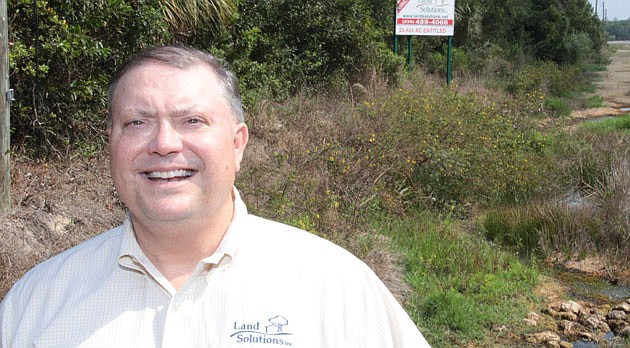When Randy Thibaut assembled a group of investors to acquire a Fort Myers tract known as Cypress Hammock back in August 2015, most of the team signed off and chipped in without ever having physically set foot on the 12990 Six Mile Cypress Parkway property.
They didn't have to.
Thanks to the advent of drones to survey and photograph sites, GPS technology that can provide satellite-based intelligence and evolving Internet software that is capable of providing reams of available material, commercial real estate investors along the Gulf Coast are increasingly buying properties sight unseen.
In some cases, tracts are trading for millions of dollars without human eyes on them first. Thibaut and his group bought Cypress Hammock, for instance, a 25.6-acre site zoned for a variety of residential uses near a busy thoroughfare, for $2.72 million. The land has more than doubled in value, by some estimates, since then.
“Drones, Google Earth software and other technology allows sophisticated real estate buyers today to see everything they need to make an informed decision regarding a real estate investment,” says Thibaut, the founder and CEO of Land Solutions Inc., a Fort Myers commercial real estate brokerage firm.
“Drones have changed everything. Drone footage can allow a buyer to preview every section of a property in question with high-resolution imaging -- including any wetlands and what surrounds a particular property.”
Florida, in particular, has seized on the trend, the result of the state's open records laws and availability of public data such as past transactions, permitting information, site-specific history, entitlements and zoning.
At the same time, as Florida's population has swelled — the state is today the third-most populous in the nation, behind only California and Texas — investors from private equity funds, home building giants and real estate investment trusts have flocked to the Sunshine State to buy land for homes, businesses, golf courses and alike.
As a result, more than ever before, Florida real estate is increasingly being purchased by out-of-state, institutional groups that are able to leverage ever more sophisticated technology at their disposal.
“The buyer pool today is much more diverse than it used to be,” Thibaut says. “People are literally buying properties all over the world, and often investors from out of town often simply don't have the time to come down here and see a property and walk it before buying. But with today's technology and information, they don't have to.”
Brokers say the trend is especially prevalent among larger, more institutional buyers, who often have in-house teams of researchers to ferret out property information from miles away.
“Buyers, especially the bigger home builders and the institutional equity firms, come to us today extremely well armed with information,” says Bill Eshenbaugh, founder of Eshenbaugh Land Co., in Tampa.
“Usually they have been to our web site, they've been on Google Earth, they've searched public property records for comps, and they're conversant about things like local impact fees.”
Thibaut estimates that as much as 30% of his brokerage transactions these days are completed involving out-of-town buyers, who use technology and the data it communicates to decide whether or not to buy.
The phenomenon isn't limited to largely vacant swaths in fast-growing, pastoral places like Lee County, however. In areas like Polk, Pasco and Manatee counties, especially, real estate brokers and builders say they are seeing deals made by buyers in absentia.
“There are a lot of things you can do now that you used not to be able to do, so buyers are taking advantage of that,” says Bruce Erhardt, executive director of land brokerage in the Americas for Cushman & Wakefield, who is based of the commercial real estate services firm's Tampa office.
“Google's street view technology provides you a good sense of what a property looks like as never before.”
But while buying sight unseen has become more common, many brokers say they don't recommend it.
Eshenbaugh recalls one $4 million land deal he thought might be scuttled when the buyer, a physician, encountered a pack of wild hogs roaming on a piece of property.
“The deal went through, luckily, but he wouldn't have known they were there in all likelihood if he hadn't been on site driving around to look at it firsthand,” Eshenbaugh says.
“It may just be me, but I advocate that I really want prospective buyers to see a piece of property before buying it. You just never know what you're going to find, or what might be around the corner from the site you're buying. Better to see things firsthand if you can.”






